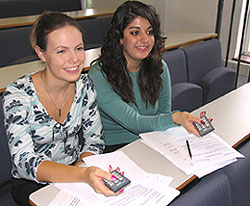Electronic voting gets students tuning in to lectures
14/10/05
Electronic voting gets students tuning in to lectures
 Pens and notepads will not be the only things marketing students reach for when they turn up to lectures at the Kingston Hill campus this semester.
Pens and notepads will not be the only things marketing students reach for when they turn up to lectures at the Kingston Hill campus this semester.
They will also be making sure they have their remote controls at the ready so they can take part in a new audience participation system that is bringing their lessons to life.
The interactive electronic voting technology, similar to that used by studio audiences on television quiz show Who Wants to be a Millionaire?, now allows the students to register their answers to lecturers’ questions at the touch of a button.
The system is being pioneered as a teaching tool at the Faculty of Business and Law and has already had a big take up amongst students.
Principal lecturer George Masikunas said it was an easy way to check how well students understood new concepts as they were discussed and initial feedback had been very encouraging. “All the students sampled said they liked the way the programme threw up questions to test their understanding,†he said. “They also told us it helped them grasp ideas more quickly and improved their concentration.â€
Third year Charis Fairhead said it had been easy to adapt to the new way of learning. “Instead of lecturers just talking constantly to us, we get to be more involved so we take more interest,†she said. Her classmate Joanna Miltiadou agreed. “When we vote we’re competing to get the answer right, so we’re all motivated and it’s good fun,†she said.
Principal lecturer Andreas Panayiotidis, who was responsible for introducing the system with Mr Masikunas, said the new teaching format had raised attendance at lectures and improved grades.
He puts the improvement in student performance down to the quick, interactive nature of the classes creating a livelier atmosphere for learning. “The success of this teaching tool is a great example of how technology can support students with their course work,†Mr Panayiotidis said. "We know that in conventional lectures students can tend to lose focus. This way everybody takes part and, as lecturers, we get the satisfaction of knowing that they’re not only learning but enjoying it.â€